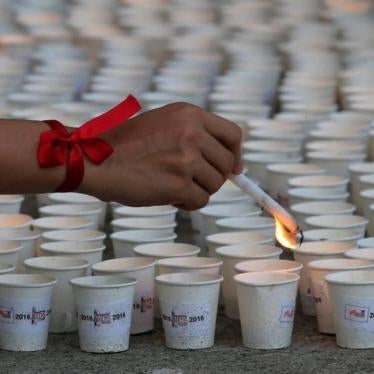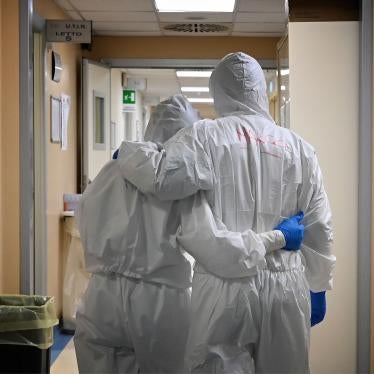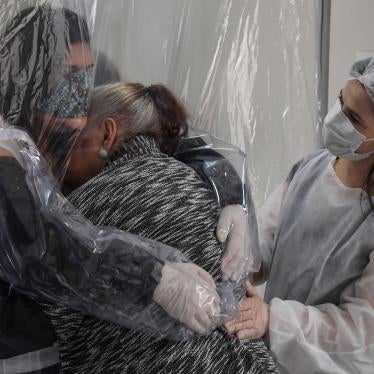Expanding access to HIV testing is critical in the fight against AIDS, but new WHO/UNAIDS guidelines pay only lip service to the conditions that will make testing successful, Human Rights Watch said today. Human Rights Watch was responding to the release of new WHO/UNAIDS guidelines on provider-initiated HIV testing and counseling.
The guidelines appropriately rule out mandatory or coercive testing and call for expanded, health facility-based testing in countries with an “enabling environment” in place and with “adequate resources” available for HIV prevention, treatment and care. But Human Rights Watch warned that few of the most affected countries have such resources and environments in place.
“Expanded HIV testing will have little impact on the AIDS epidemic unless there is a real commitment to universal access to prevention and treatment,” said Joe Amon, director of the HIV/AIDS program at Human Rights Watch. “WHO and UNAIDS are right to be worried that without an ‘enabling environment’ there are real risks in expanding testing. Human Rights Watch has extensively documented coercive testing, breaches of confidentiality, and violence against people living with HIV.”
The WHO/UNAIDS guidelines say that in addition to expanding access to HIV testing, “equal efforts must be made to ensure that a supportive social, policy and legal framework is in place to maximize positive outcomes and minimize potential harms to patients” including: social mobilization, health care provider training, a strong monitoring and evaluation system and laws and policies against discrimination based on HIV status, risk behavior or gender.
Human Rights Watch pointed out that few countries have strong legal frameworks in place and enforced, and that in many regions and countries resources are inadequate. Worldwide, less than 10 percent of injecting drug users has access to HIV prevention. About the same percentage of pregnant women living with HIV in Africa has access to the medicine necessary to prevent transmission to their infants. The United Nations set a goal of universal access to HIV prevention and treatment by 2010, but currently only an estimated 2 million of the 7 million people living with HIV in urgent need of treatment are receiving it.
“WHO and UNAIDS must do more than offer specific guidelines about testing and vague calls for better policy and legal frameworks,” Amon said. “Expanding access to HIV testing is important, but it will only work alongside better prevention and treatment efforts, and an end to stigma against people living with HIV.”
Human Rights Watch work on HIV testing
The following testimonies come from Human Rights Watch reports on HIV testing:
Violence Against Women
“I am married but I came alone [for testing]. I never informed him. He said, ‘if I know you’re positive I’m going to kill you.’ We used to quarrel. He beat me. I never talked about it … I get scared that [the children] will tell him they were injected. I can’t even test the children because he’ll be angry and ask why.”
– Human Rights Watch interview with Alice Namagembe, Entebbe, December 13, 2002, “Just Die Quietly: Domestic Violence and Women’s Vulnerability to HIV in Uganda.”
“I’m scared of telling him that I went for a test. . . . I want them to counsel me first until I believe it. . . . I’m scared that he’ll think I was cheating on him. He might kill me and I want to live.”
– Human Rights Watch interview with Masturah Tibegwya, Luwero, December 18, 2002, “Just Die Quietly: Domestic Violence and Women’s Vulnerability to HIV in Uganda.”
Discrimination
“My auntie wants us to find our own accommodation because my husband and I are sick. Some people think that if you stay with someone with HIV you get the virus. The landlords discriminate against people with HIV. I have tried to rent a house, but the minute they’ve known my status they have said no. If you are HIV positive and disabled they say no. You can’t say your status; you have to keep it a secret, because if the landlord finds out they kick you out.”
– Human Rights Watch interview with Nelly S., (not her real name), Mabvuku, April 22, 2006, “No Bright Future: Government Failures, Human Rights Abuses, and Squandered Progress in the Fight Against HIV/AIDS in Zimbabwe.”
“We would like to send our girl to kindergarten, but you have to show your medical records there, so we can’t.”
– Human Rights Watch telephone interview with Elena P., St. Petersburg, June 15, 2004, “Positively Abandoned: Stigma and Discrimination against HIV-Positive Mothers and their Children in Russia.”
“All the parents demanded that they leave or they wouldn’t send their own children. And they did – for about nine days they kept their children at home. Just Bency and Benson [two HIV positive orphans] were there.”
– Human Rights Watch group interview with Geevarghese John, Rev. K.Y. Jacob, Bency, and Benson, Kollam district, Kerala, November 23, 2003, “Future Forsaken: Abuses Against HIV/AIDS Infected Children in India.”
Violations in access to work and in the workplace
“They did a test. They did not tell me what it was. They just took my blood, right there. Then they fired me.”
– Human Rights Watch interview with Gabriela López, La Romana, January 13, 2004, “A Test of Inequality: Discrimination Against Women Living with HIV in the Dominican Republic.”
Denial of ARVs and other medical treatment
“I gave them the test result, and they did not want to treat me. … They had me go into labor, and nothing, no one attended to me. … I fell on the floor, and no one caught me. The cleaning lady caught me finally. They did not even clean my baby; in the beginning they wouldn’t let me see him. They brought him to me all dirty. I knew it was because of this [my HIV status].”
– Human Rights Watch interview with Rosalia Rodríguez, Santo Domingo, January 15, 2004, “A Test of Inequality: Discrimination Against Women Living with HIV in the Dominican Republic.”
“The doctor said to the paramedics, ‘Why did you bring me an AIDS patient? Why didn’t you take her where she actually should go.’ He meant to the AIDS hospital. He refused to treat me.”
– Human Rights Watch interview, Mykolaiv, July 7, 2005, “Rhetoric and Risk: Human Rights Abuses Impeding Ukraine’s Fight against HIV/AIDS.”
Lack of confidentiality/inadequate counseling
“Three months ago, I gave birth. They did a test on me, then after I gave birth they came to tell me that I could not breastfeed. The doctor said I had to bring in my husband. They told me with my husband there. They had told him [that I was HIV-positive] before they told me.”
– Human Rights Watch interview with Jessica Torres, San Pedro de Macorís, January 14, 2004, “A Test of Inequality: Discrimination Against Women Living with HIV in the Dominican Republic.”
Fear of abuse/stigma
“Your family won’t eat with you, they give you food to eat apart from them, and they won’t have contact with you. Your friends ignore you. They are afraid of getting it from casual contact. If you pass them a cigarette, they won’t accept it.”
– Human Rights Watch interview with Han, Kunming, Yunnan, 2002, “Locked Doors: The Human Rights of People Living with AIDS in China.”








